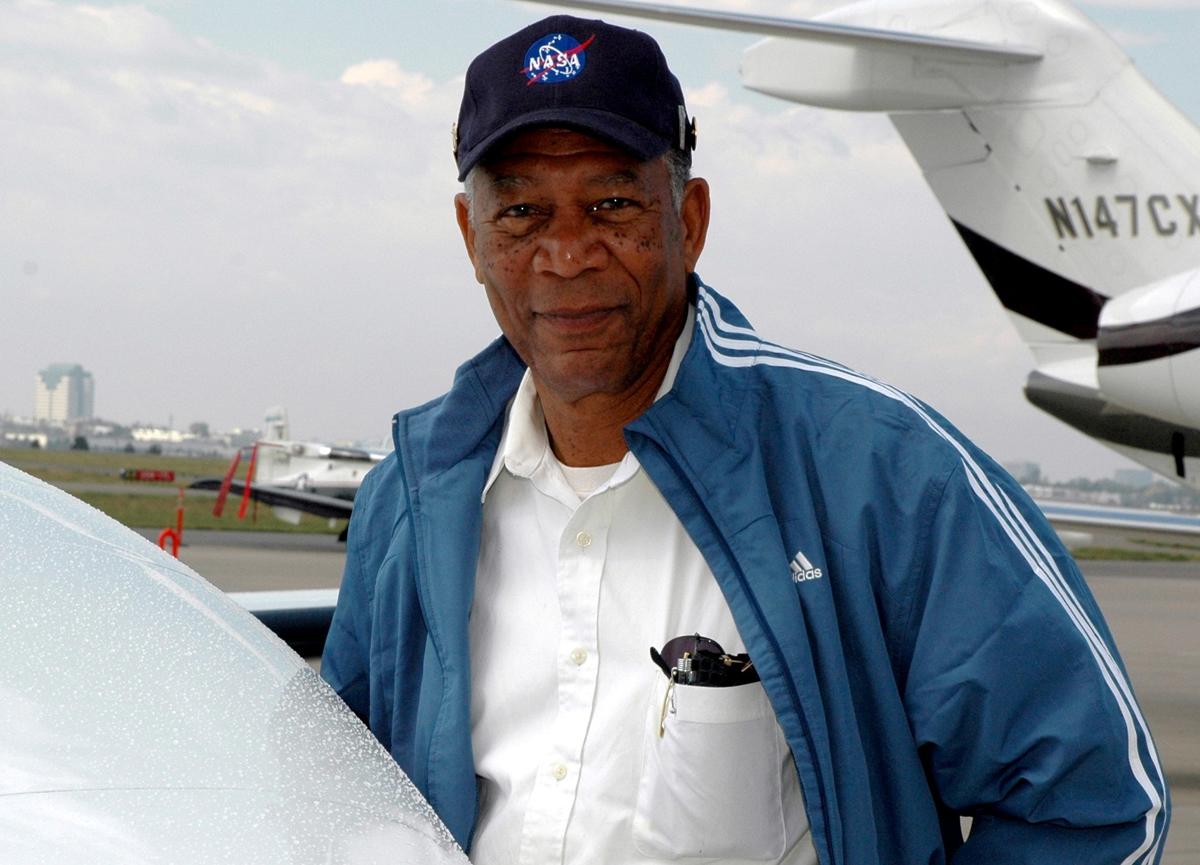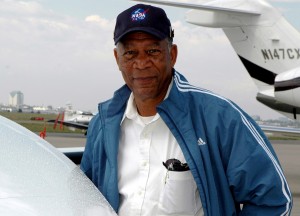When Morgan Freeman thinks of childhood, Saturday stands out in his mind. After doing chores all morning, he inevitably ended up at the local theater, where he would watch cowboy movies. However, another genre also thrilled him: war movies.
“I wanted to be a fighter pilot,” Freeman recalled. “I wanted to strafe freight trains and dogfight and re-fight World War II.”
The movies that inspired him included “Battle Hymn,” “The Bridges at Toko-Ri,” “Strategic Air Command” and “God is My Copilot.”
“I watched anything that had aircraft in it—flying from the ground or from off a ship,” he said.
Other children with that goal might have spent hours building models, but Freeman didn’t.
“I wasn’t too good with model aircraft. I did build one, and it was fine, but I couldn’t gunk it, so I just stepped on it!” he said.
Freeman joined the Air Force when he was 18, in hopes of becoming a jet pilot.
“That wasn’t happening in the 1950s,” he said. “I guess if I’d come out of college, it would’ve been somewhat easier. I don’t blame the Air Force so much as time and circumstance. I didn’t like military service, so it was a wash anyway.”
If he had realized his dream of being a jet pilot, instead of serving as a mechanic, Freeman might have forgotten another childhood passion: acting. He had often lost himself in Shakespeare, and proved his ability in the lead role in a school play. While in the military, he enrolled in Los Angeles City College, to study dance and theatre arts. After his honorable discharge in San Bernardino, one acting job led to another, and he ended up in New York.
In 1967, he made his Broadway debut with Pearl Bailey in “Hello, Dolly!” A few years later, he landed a role as “Easy Reader” on “The Electric Company,” an educational American children’s TV series produced by the Children’s Television Workshop (now Sesame Workshop) for PBS.
Freeman had parts in several movies before his portrayal of a pimp in 1987’s “Street Smart,” which won him the Los Angeles, New York and National Society of Film Critics Awards for best supporting actor and nomination for an Academy Award and Golden Globe Award. Two years later, he was again nominated for an Academy Award, this time as best actor in a leading role for his performance in “Driving Miss Daisy.” His role of chauffeur Hoke Colburn, which he also played in the stage version, earned him the Golden Globe Award and The Silver Bear for best actor at the Berlin Film Festival. That same year, he also starred in “Lean on Me” and “Glory.”
In 1993, he made his film directorial debut with “Bopha!” starring Danny Glover and Alfre Woodard. Soon after that, he formed a production company named Revelations Entertainment. His films in the 1990s and early 2000s included “Unforgiven” (1992); “The Shawshank Redemption” (1994), for which he again was nominated for best actor in a leading role; “Se7en” (1995); “Kiss the Girls” (1997); “Hard Rain” (1998); “Deep Impact” (1998); “Under Suspicion” (2000); “Nurse Betty” (2000); “Along Came a Spider” (2001); “High Crimes” (2002); “The Sum of All Fears” (2002); “Bruce Almighty” (2003); and “The Big Bounce” (2004).
Although he would never be a fighter pilot, Freeman would at least become a pilot. That occurred after he moved back to the Mississippi Delta and met pilot and attorney Bill Luckett. The two would team up to create a restaurant, Madidi, and a blues club, Ground Zero.
Freeman recalls that one day, Luckett invited him to fly with him in his Seneca II.
“When Bill and I started tooling around in the sky, he said, ‘You have to get formal lessons. You have to learn how to fly,'” Freeman remembered.
Luckett remembers the night Freeman decided to take the plunge.
“Morgan had mentioned once or twice in the late ’90s and coming into the turn of the century that one day he might want to learn to fly,” Luckett recalled. “Then, one night, we were at Madidi with a group of people. Out of the blue, he said, ‘Bill, I’m ready.’ I looked up and said, ‘You’re ready to leave? Ready to go to the blues club?’ He said, ‘I’m ready to learn to fly.’ I said, ‘OK. Two o’clock, tomorrow, Clarksdale Airport.'”












